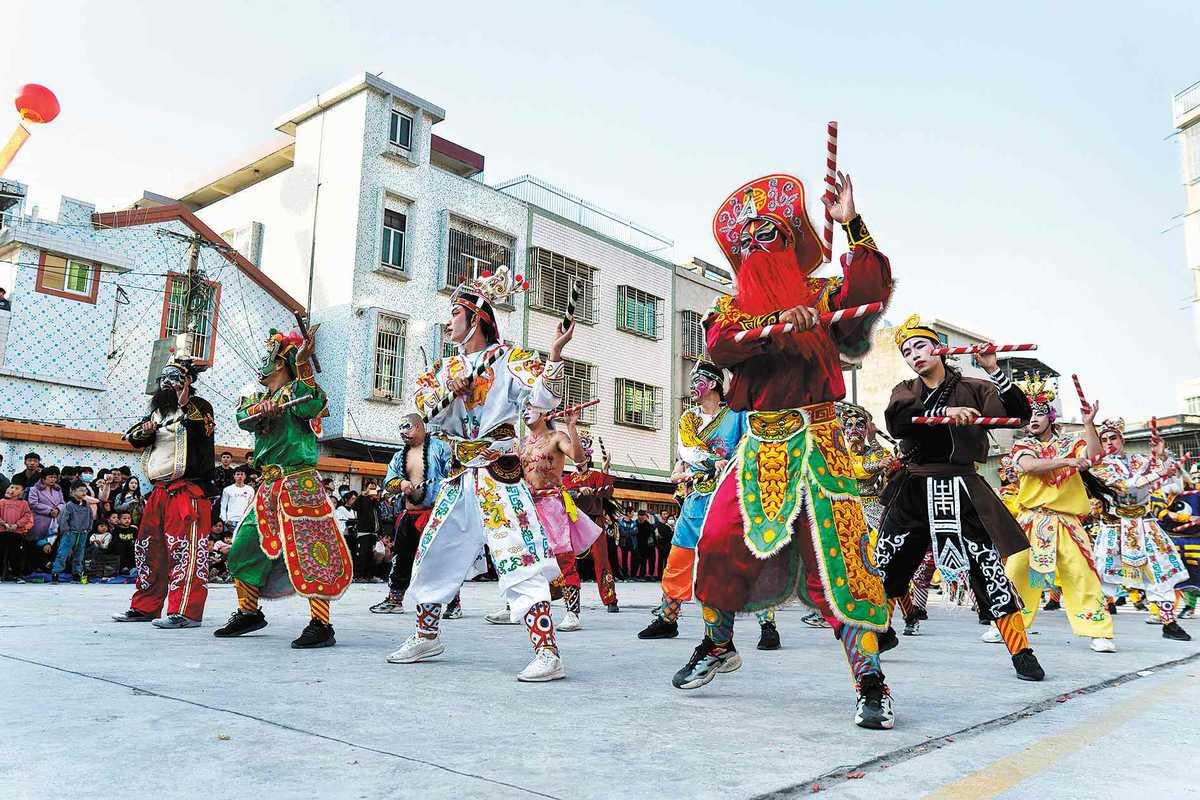Traditional warrior dance now welcomes all
 0 Comment(s)
0 Comment(s) Print
Print E-mail China Daily, February 15, 2023
E-mail China Daily, February 15, 2023

Members of the Xixiang Yingge Dance Team perform in a square in Tong yu town, Shantou, Guangdong, on Jan 3, 2021. [Xinhua]
Clad in a black costume and brandishing a black-and-white serpent prop, Chen Zhihui led dozens of performers through a mesmerizing dance as they rhythmically struck drumsticks together in unison.
The Yingge Dance, or "dance to the hero's song", merges opera, dance and martial arts. Dating back to the Ming Dynasty (1368-1644), it is often performed during traditional Chinese festivals but became a sensation this Chinese New Year after videos of performances racked up millions of views online.
Chen comes from Tongyu township in Guangdong province. He has more than 20 years of experience in Yingge dancing and is nicknamed "fat snake" for his sturdy physique and snake-dancing abilities.
Before the Spring Festival, he only had about 2,000 followers on Douyin — the Chinese version of popular short-video sharing app TikTok — but after the holiday, that increased to around 20,000. People even drove from other provinces to take a photo with him.
Contemporary Yingge dancing is closely related to Outlaws of the Marsh, a classic Chinese novel.
It is usually performed by 36 people, who correspond to the 36 heroes in the novel, according to Chen Songqi, who teaches the dance.
The length of a Yingge performance varies, with some large-scale events lasting throughout the day. The troupe is mostly composed of amateurs, and members practice in the evenings after work.
Chen said that to prepare for a full day of performances, the troupe has to practice for at least six months, adding that the heavy costumes and props can be a challenge when dancing for so long.
"Despite the physical demands, more and more young people are joining our team out of a love for traditional culture," he said.
Yingge dancing continues to develop and change. Traditionally performed only by men, it is now welcoming more women.
Wu Yanhua, 27, is the deputy leader of a female troupe.
"Practicing Yingge not only improves physical fitness but also helps people learn about traditional culture, and it is proving popular among parents and students," she said.
Wu quit her job as a kindergarten teacher to open a nail salon, so now she has more time to dance and teach Yingge long-term.
"I often find inspiration for new dance moves in daily life," Wu said. "Once, I saw an elderly person practicing tai chi in a park and created new moves incorporating the ancient martial art."
Members of Wu's troupe are taking the dance to more places. Xiao Jingtong and Zheng Yuanxuan set up a Yingge dance club at their college.
"Now the troupe has 20 members, many of whom come from areas outside the Chaoshan region (in the east of Guangdong)," Xiao said.
"I believe the growing awareness of Yingge dancing this year will introduce more people to the charm of this traditional art form."






Go to Forum >>0 Comment(s)